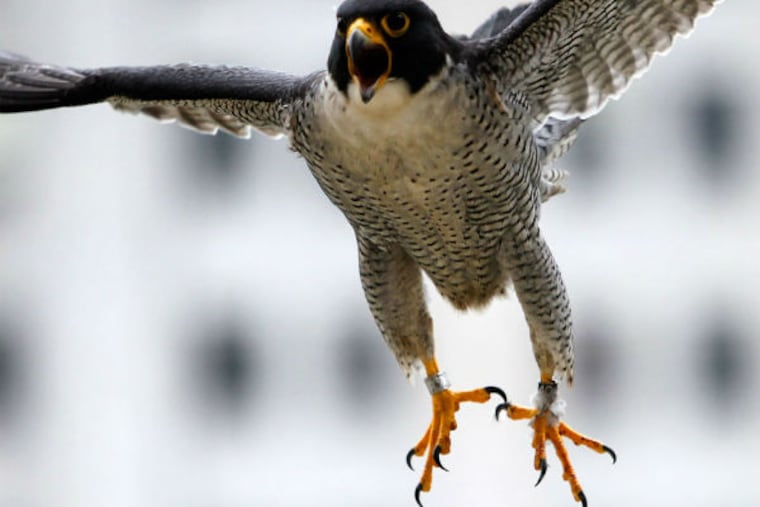Rare peregrine falcons nest in City Hall
A Pennsylvania Game Commission coordinator spent yesterday morning inside City Hall's tower banding four healthy baby peregrine falcons.

EVEN AS F. ARTHUR McMorris was being dive-bombed - with just a broom between him and the fastest animal in the world - he had nothing but pride for his aggressors.
"The more aggressive they are, the more we like it," McMorris said. "That means they're better parents."
McMorris, the peregrine-falcon coordinator for the Pennsylvania Game Commission, spent yesterday morning inside City Hall's tower banding four healthy baby peregrine falcons that he estimated to be about 30 days old.
The birds are the offspring of one of just 33 pairs of peregrine falcons known in the state. The couple, who mate for life, began nesting at a man-made nesting box on City Hall's tower in 2009, after the nest sat empty for nine years. They moved out in 2010, but came back in 2011, McMorris said.
Game Commission volunteers Ed Mutzer and Amy Carpenter have been peeping the little guys for weeks from across the way on the 25th-story observation deck of 1 South Broad.
"I fall in love with them every time I see them. The creativity of God in all these creatures is astounding," Carpenter said. "When you observe them for two to three hours, you see they have daily lives, they do things, they notice things."
Carpenter, 54, and Mutzer, 69, had counted five baby chicks in the nest. But when McMorris began to pull the babies in one by one - as mom and dad dive-bombed and squawked the entire time - he made a sad discovery: One of the babies had died. The cause of the bird's death was not clear. It had no outward signs of trauma and appeared to be just days younger than its siblings.
The others, however, were healthy with bright eyes and strong lungs. As McMorris and company weighed and checked the birds for bugs before banding them inside the tower, the parents watched nervously through a window.
An observer asked if the myth that birds will reject their young after they've been touched by human hands is true.
"If I went and picked up [your] youngest, held it and looked at it for bugs, would you abandon it?" McMorris asked. "They are mad as all hell at us right now, but they will accept them back."
The first documented nesting of peregrine falcons at City Hall was in 1946, but it's believed they may have nested under Billy Penn's watchful gaze as far back as 1918.
Although peregrine falcons have been taken off the federal list of endangered species, they remain endangered in Pennsylvania, McMorris said. They are birds of prey that hunt in flight and can exceed 200 mph in a single dive.
For a while, there were only 32 known pairs in the state, but Carpenter spotted the 33rd pair - and their baby - nesting two weeks ago at the White Building at the Hospital of the University of Pennsylvania.